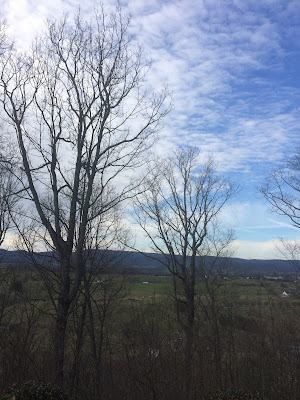Although a preview of warm,
summer-like temperatures occurred in Southwest Virginia for extended periods throughout
the month of February, it appears that many plants and trees made the correct
decision to resist the urge to bloom until the aforementioned warmer
temperatures become more consistent. This
picture, captured on March 5th, 2018 in Wytheville, Virginia depicts
a group of normally vibrant, hearty trees that have remained dormant despite
the warmer temperatures earlier in the year.
While the specific species of the group of trees is unknown, it seems to
be a common theme amongst all types of vegetation in this area not to have
produced a bud yet, resulting in a reduced presence of wildlife. This subject is interesting to me because I
had never pondered what causes flowers to bloom at different dates during the
spring before and the effects that this process may have on animals. Exactly what determines the timing of flora
blooming has been the subject of a highly contested debate; however, it appears
that most scientists are now in agreement that vegetation is able to sense the
amount of sunlight it receives per day.
This capability allows the greenery to determine the approximate length
of each day, which in turn influences their decision as to what time of the
year they will bloom. Another
interesting aspect of this picture is the background of the photo. Logically, the cumulus clouds floating in the
sky signal a day comprised of mild, sunny weather, which is perfect for
enjoying outdoor activities. Luckily,
this area avoided the arrival of any cumulonimbus clouds, which warn of a storm
in the near future. It is quite
remarkable the amount of information that can be drawn from a geographic
picture based strictly on the content that it illustrates.
Sources:
Britt, Robert Roy. “Mystery
Solved: How Plants Know When to Flower.” LiveScience, Purch, 11 Aug. 2005,
www.livescience.com/377-mystery-solved-plants-flower.html.

No comments:
Post a Comment